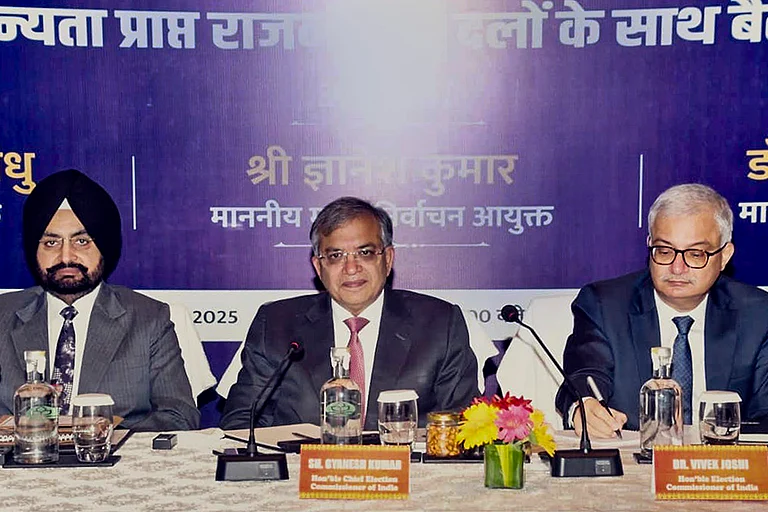Bihar Assembly elections will be held in two phases on November 6 and 11, with counting on November 14 and the process concluding by November 16.
The Election Commission announced extensive security and monitoring measures, including dedicated observers, CAPF deployment, and mobile deposit counters at polling stations.
Over 7.43 crore voters across 243 constituencies will cast their votes, as the Model Code of Conduct comes into effect and new voter card issuance rules are introduced.
Two Phase Bihar Assembly Elections: Key Dates, Security Measures, and EC’s New Rules
Chief Election Commissioner Gyanesh Kumar announces November 6 and 11 as polling dates; Model Code of Conduct now in force as EC unveils tighter monitoring, voter reforms, and security plans.
Bihar’s assembly elections will be conducted in two phases, with voting scheduled for November 6 and 11, and counting of votes on November 14, Chief Election Commissioner Gyanesh Kumar announced on Monday. The entire election process will conclude by November 16.
Addressing the press, Kumar stated, “Bihar elections will be held in two phases on November 6 and 11. Counting of votes will be done on November 14.” He added that “it is mandatory to complete counting of postal ballots before the last two rounds of counting.”
Accompanied by Election Commissioners Sukhbir Singh Sandhu and Vivek Joshi, Kumar described the Bihar polls as the “mother of all elections,” assuring that the process will be conducted smoothly and peacefully with special emphasis on maintaining law and order.
With the announcement of the poll schedule, the Model Code of Conduct has come into effect in Bihar.
Procedure of Polling
Of the state’s 243 assembly seats, 121 constituencies will vote in the first phase on November 6, while the remaining 122 will go to the polls in the second phase on November 11.
The announcement followed a comprehensive review of Bihar’s poll preparedness, during which the Election Commission consulted key political parties and evaluated logistical arrangements. The elections must be completed before November 22, when the current Assembly’s tenure ends. To encourage higher voter turnout, the schedule avoids major festivals like Diwali and Chhath.
According to Kumar, more than 90,712 polling stations will be set up for Bihar’s 7.43 crore voters. Candidates can submit their nominations until October 17, with notifications for the first and second phases issued on October 10 and October 13 respectively. Nominations for the second phase can be filed until October 20.
Safety and Security Measures
The Election Commission outlined an extensive plan to ensure free and fair polls, including measures to combat fake news at the district level. Each constituency will have a dedicated general observer—a first in Bihar—acting as the “eyes and ears” of the Commission.
District magistrates and police superintendents have been instructed to adopt a zero-tolerance approach toward violence. Adequate Central Armed Police Forces (CAPFs) will be deployed, with strict monitoring of checkpoints to curb illegal movement of liquor, cash, and narcotics.
Unique security measures include horse patrols at 250 polling booths in Bihar’s Diara region and boat patrols at around 197 polling stations.
Kumar also clarified that CCTV footage from polling stations will only be shared with High Courts, as public access could compromise voter privacy. “Webcasting footage is akin to Form 17A, which is not shared with political parties to protect voter identity,” he explained.
To prevent mobile phone misuse inside polling stations, mobile deposit counters will be set up for the first time. Voters will be required to deposit their phones—either in pigeonhole boxes or jute bags—before entering the booth. Only switched-off phones will be allowed within 100 meters of the polling area.
Bihar SIR
The Election Commission asserted that all verified voters have received updated voter cards and accused unnamed critics of running an “online campaign” against the revision exercise. It also announced new procedures to issue voter cards within 15 days of application to ensure no eligible voter is left out.
Opposition parties, however, criticised the EC and the ruling BJP, alleging that the Special Intensive Revision (SIR) was timed to disenfranchise underprivileged groups who typically support them. They claimed the revision was an attempt to suppress votes ahead of the polls.
With PTI inputs.

